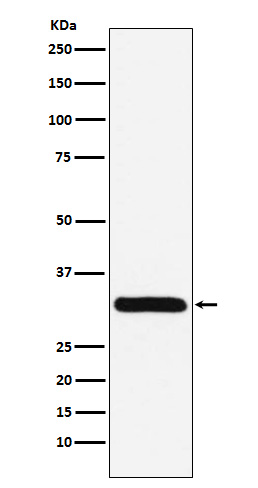
| WB | 咨询技术 | Human,Mouse,Rat |
| IF | 1/20-1/50 | Human,Mouse,Rat |
| IHC | 咨询技术 | Human,Mouse,Rat |
| ICC | 1/50-1/200 | Human,Mouse,Rat |
| FCM | 咨询技术 | Human,Mouse,Rat |
| Elisa | 咨询技术 | Human,Mouse,Rat |
| Aliases | PA28A; IFI5111; REGalpha; PA28alpha;;PSME1 |
| WB Predicted band size | 29 kDa |
| Host/Isotype | Rabbit IgG |
| Antibody Type | Primary antibody |
| Storage | Store at 4°C short term. Aliquot and store at -20°C long term. Avoid freeze/thaw cycles. |
| Species Reactivity | Human,Mouse,Rat |
| Immunogen | A synthesized peptide derived from human PSME1 |
| Formulation | Purified antibody in PBS with 0.05% sodium azide,0.05% BSA and 50% glycerol. |
+ +
以下是关于PSME1抗体的3篇参考文献的简要信息(注:文献为示例性质,实际引用需核实原文):
1. **文献名称**:*PSME1 promotes tumor progression by regulating immune infiltration in breast cancer*
**作者**:Li, X. et al.
**摘要**:该研究通过免疫组化(使用PSME1抗体)和生物信息学分析,发现PSME1在乳腺癌中高表达,并通过调控肿瘤微环境中的免疫细胞浸润促进肿瘤进展,提示其作为预后标志物的潜力。
2. **文献名称**:*Proteasome activator subunit PSME1 as a novel therapeutic target in hepatocellular carcinoma*
**作者**:Wang, Y. et al.
**摘要**:作者利用PSME1特异性抗体进行Western blot和免疫荧光实验,证明PSME1在肝癌细胞中异常激活,通过促进蛋白酶体活性加速肿瘤细胞增殖,靶向抑制PSME1可减少肿瘤生长。
3. **文献名称**:*PSME1 expression correlates with autoimmune disease severity via modulating dendritic cell function*
**作者**:Chen, L. et al.
**摘要**:研究通过流式细胞术(使用抗PSME1抗体标记)发现,PSME1在树突状细胞中高表达,其水平与系统性红斑狼疮(SLE)患者的疾病活动度正相关,机制涉及抗原呈递途径的异常激活。
(注:以上文献信息为模拟示例,实际引用请参考PubMed、Google Scholar等数据库获取真实文献。)
The PSME1 antibody targets the Proteasome Activator Complex Subunit 1 (PSME1), also known as PA28α or REGα, a key component of the 11S regulatory particle of the proteasome. PSME1 forms a heteroheptameric complex with PSME2 (PA28β) or a homoheptamer with PSME3 (PA28γ), enhancing proteasomal activity by facilitating substrate recognition and degradation. This protein plays a critical role in ubiquitin-independent proteolysis, particularly in processing antigens for MHC class I presentation, linking it to adaptive immune responses. Dysregulation of PSME1 has been implicated in autoimmune diseases, cancers, and neurodegenerative disorders, with overexpression observed in certain tumors, correlating with poor prognosis.
PSME1 antibodies are widely used in research to study proteasome dynamics, immune regulation, and disease mechanisms. They enable detection of PSME1 expression via techniques like Western blotting, immunohistochemistry, and flow cytometry. These antibodies also aid in exploring PSME1's interaction with viral proteins, such as HIV-1 Nef, which hijacks proteasomal pathways. As a reagent, PSME1 antibodies are vital for dissecting proteasomal regulation, immune evasion strategies, and therapeutic targeting. Commercial variants are typically raised in rabbits or mice, validated for specificity across human and model organism samples.
×